Related Research Articles
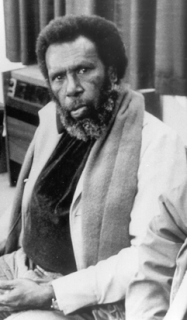
Edward Koiki Mabo was an Indigenous Australian man from the Torres Strait Islands known for his role in campaigning for Indigenous land rights in Australia, in particular the landmark decision of the High Court of Australia that overturned the legal doctrine of terra nullius that had previously characterised Australian law with regard to land and title. High court judges considering the case Mabo v Queensland found in favour of Mabo, which led to the Native Title Act 1993 and established native title in Australia, officially recognising the rights of Aboriginal and Torres Strait Islander people in Australia to own and use the land on which their families had lived for millennia.

The University of Notre Dame Australia is a national Roman Catholic private university with campuses in Fremantle and Broome in Western Australia and Sydney in New South Wales. The university also has eight clinical schools as part of its school of medicine located across Sydney and Melbourne and also in regional New South Wales and Victoria.

Lowitja Lois O'Donoghue Smart, AC, CBE, DSG is an Aboriginal Australian retired public administrator. In 1990-1996 she was the inaugural chairperson of the Aboriginal and Torres Strait Islander Commission (ATSIC). She is patron of the Lowitja Institute, a research institute for Aboriginal & Torres Strait Islander health and wellbeing.
Reconciliation Australia is a non-government, not-for-profit foundation established in January 2001 to promote a continuing national focus for reconciliation between Indigenous and non-Indigenous Australians. It was established by the Council for Aboriginal Reconciliation, which was established to create a framework for furthering a government policy of reconciliation in Australia.

Aboriginal Australians are the various Indigenous peoples of the Australian mainland and many of its islands, such as Tasmania, Fraser Island, Hinchinbrook Island, the Tiwi Islands, and Groote Eylandt, but excluding the Torres Strait Islands. The term Indigenous Australians refers to Aboriginal Australians and Torres Strait Islanders collectively. It is generally used when both groups are included in the topic being addressed. Torres Strait Islanders are ethnically and culturally distinct, despite extensive cultural exchange with some of the Aboriginal groups. The Torres Strait Islands are mostly part of Queensland but have a separate governmental status.

A truth commission, also known as a truth and reconciliation commission or truth and justice commission, is an official body tasked with discovering and revealing past wrongdoing by a government, in the hope of resolving conflict left over from the past. Truth commissions are, under various names, occasionally set up by states emerging from periods of internal unrest, civil war, or dictatorship. In both their truth-seeking and reconciling functions, truth commissions have political implications: they "constantly make choices when they define such basic objectives as truth, reconciliation, justice, memory, reparation, and recognition, and decide how these objectives should be met and whose needs should be served".

Aboriginal deaths in custody is a political and social issue in Australia. It rose in prominence in the early 1980s, with Aboriginal activists campaigning following the death of 16-year-old John Peter Pat in 1983. Subsequent deaths in custody, considered suspicious by families of the deceased, culminated in the 1987 Royal Commission into Aboriginal Deaths in Custody (RCIADIC).

Patrick Lionel Djargun Dodson is an Australian politician representing Western Australia in the Australian Senate. He is a Yawuru elder from Broome, Western Australia. He has been chairman of the Council for Aboriginal Reconciliation, a Commissioner into Aboriginal Deaths in Custody, and a Roman Catholic priest. He was the winner of the 2008 Sydney Peace Prize and the 2009 John Curtin Medallist. His brother is Mick Dodson, also a national Indigenous Australian leader.
Mark Bin Bakar is an Indigenous Australian musician, comedian and radio announcer, writer, director/producer as well as an indigenous rights campaigner based in Broome, in the Kimberley region of Western Australia. He is best known for his radio and television character, the acid-tongued Mary Geddarrdyu or Mary G, who has gained a national cult following and has been described as a Dame Edna Everage in thongs. In character Mary G has hosted a radio program and hosted a variety show broadcast nationally on SBS Television.
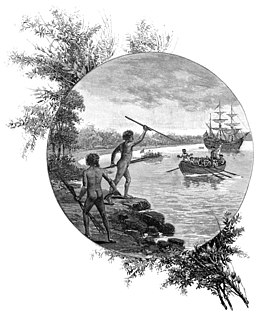
The history of Indigenous Australians began at least 65,000 years ago when humans first populated the Australian continental landmasses. This article covers the history of Aboriginal Australian and Torres Strait Islander peoples, two broadly defined groups which each include other sub-groups defined by language and culture.

Beagle Bay is a medium-sized Aboriginal community on the western side of the Dampier Peninsula, north of Broome in the Kimberley region of Western Australia.
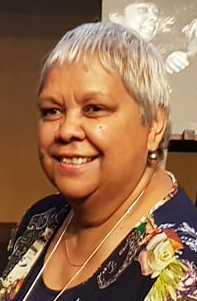
Jacqueline Gail "Jackie" Huggins is an Aboriginal Australian author, historian, academic and advocate for the rights of Indigenous Australians. She is a Bidjara/Pitjara, Birri Gubba and Juru woman from Queensland.
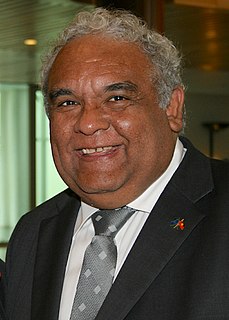
Thomas Edwin Calma,, is an Aboriginal Australian human rights and social justice campaigner. He is the sixth chancellor of the University of Canberra, a post held since January 2014, after two years as deputy chancellor. Calma is the second Aboriginal or Torres Strait Islander person to hold the position of chancellor of any Australian university.
Elizabeth Grant CF is an Australian architectural anthropologist, criminologist and academic working in the field of Indigenous Architecture. She is a Churchill Fellow and has held academic positions at a number of universities including The University of Adelaide and is Associate Professor of Architecture and Urban Design at RMIT University's RMIT School of Architecture and Design and holds an Adjunct Professorship at the University of Canberra and has held an adjunct Associate Professorship at the University of Queensland. She researches, writes, and is an activist focusing on architecture and design with Indigenous peoples as architectural practice and a social movement, and the observance of human rights in institutional architecture. She also has expertise in Indigenous housing and homelessness, design for Indigenous peoples living with disability, and indigenising public places and spaces. She is a regular guest on the Australian Broadcasting Corporation's Radio National and ABC Local Radio. She regularly writes and reviews architectural projects for architectural magazines such as Architecture Australia, the journal of the Australian Institute of Architects, the Australian Design Review, and others.
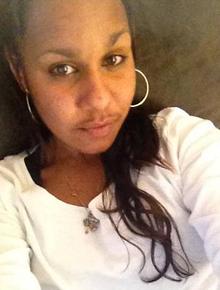
Julieka Ivanna Dhu was a 22-year-old Aboriginal Australian woman who died in police custody in South Hedland, Western Australia, in 2014. On 2 August that year, police responded to a report that Dhu's partner had violated an apprehended violence order. Upon arriving at their address, the officers arrested both Dhu and her partner after realising there was also an outstanding arrest warrant for unpaid fines against Dhu. She was detained in police custody in South Hedland and was ordered to serve four days in custody in default of her debt.
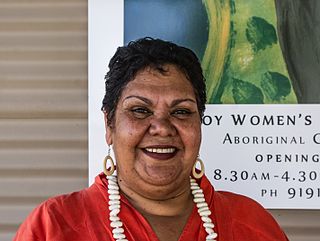
June Oscar AO is an Australian Aboriginal woman of Bunuba descent, Indigenous rights activist, community health and welfare worker, film and theatre producer, and Aboriginal and Torres Strait Islander Social Justice Commissioner. Oscar is best known for her fight against Fetal Alcohol Spectrum Disorder (FASD) and work in improving the lives of Aboriginal people in remote communities. In 2007, she led the successful campaign for alcohol restrictions in the Kimberley town of Fitzroy Crossing.
Australians for Native Title and Reconciliation (ANTaR) is an independent, national non-government, not-for-profit, community-based organisation founded in 1997 which advocates for the rights of Aboriginal and Torres Strait Islander people in Australia and aims to help overcome disadvantage. Its staff, board and membership comprise mainly non-Indigenous people who support Indigenous voices and interests.
Anne Pattel-Gray is an Aboriginal Australian theologian and author who is an expert on Black theology. She is a descendant of the Bidjara people of Queensland and was the first Aboriginal person to earn a PhD at the University of Sydney.
Elsie Heiss, also known as Aunty Elsie, is an Indigenous Australian, a Wiradjuri elder and a Catholic religious leader. She has led Aboriginal Catholic Ministry programs for over three decades and was NAIDOC Female Elder of the Year in 2009.
References
- 1 2 3 4 5 Rabbitt, Elaine. "Henderson-Yates, Professor Lyn - Woman - The Encyclopedia of Women and Leadership in Twentieth-Century Australia". www.womenaustralia.info. Retrieved 29 July 2019.
- 1 2 3 Williams, Amy (14 July 2011). "Awards a way forward". The West Australian. Retrieved 29 July 2019.
- 1 2 "Missing boy's case linked to Tassie child killer". The West Australian. 25 November 2011. Retrieved 29 July 2019.
- ↑ "WA inquest into boy missing since 1974". au.news.yahoo.com. Retrieved 29 July 2019.
- ↑ "Inquest into Jimmy Taylor cold case". PerthNow. 7 June 2014. Retrieved 29 July 2019.
- 1 2 Quince, Lyn (29 August 2008). "Opening of Nulungu Centre for Indigenous Studies at Notre Dame, Broome". Media Release Archive.
- ↑ Dame, Notre (21 February 2018). "Staff". Notre Dame. Retrieved 29 July 2019.
- ↑ Mills, Vanessa (1 December 2010). "University sacks almost half its staff". ABC News. Retrieved 29 July 2019.
- ↑ Kalmar, Nicola (4 December 2012). "Centre to boost literacy skills in Broome". The West Australian. Retrieved 29 July 2019.
- ↑ "'Can't be what you can't see': The transition of Aboriginal and Torres Strait Islander students into higher education Final Report 2014" (PDF).
- ↑ "Take Off Your Shoes, Walk on the Ground: The Journey Towards Reconciliation in Australia". Proquest. Retrieved 29 July 2019.
- ↑ "Staff". DAHS. Retrieved 9 September 2020.
- ↑ Sainty, Lane. "This Woman Grew Up In The Worst Suicide Region In Australia. Now She's Working To End The Crisis". BuzzFeed. Retrieved 29 July 2019.
- ↑ Sainty, Lane. "An Aboriginal Health Service In One Of Australia's Worst Suicide Regions Is Self-Funding Mental Health Roles". BuzzFeed. Retrieved 29 July 2019.